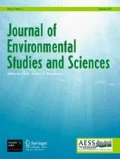Abstract
In the past decade, systematic studies have indicated a significant regression in scientific literacy in nonscience students and students across science, technology, engineering, and mathematics disciplines in higher education. Of particular concern, evaluations of introductory lecture-based undergraduate courses have indicated deficiencies in promoting students’ understanding of the role of science and how the scientific community conducts science. In an effort to introduce students to the scientific enterprise, an inquiry-based poster project was developed for a large non-majors environmental science class at a public Midwestern university. Through a term-long project, students (n = 64) worked in a collaborative means to collect and analyze data regarding sustainability topics. Students’ findings were disseminated in a poster presentation during a culminating research symposium that was attended by departmental faculty and university administrators. This paper describes the development and implementation of the inquiry-based project with some preliminary data demonstrating the effectiveness of this activity in promoting student learning and engagement.



Similar content being viewed by others
Notes
An example of a pro forma contract is available electronically in “Online Resource 2”.
References
AAAS (American Association for the Advancement of Science) (1990) Science for all Americans. Oxford University Press, New York
AAAS (American Association for the Advancement of Science) (1993) Benchmarks for science literacy: Project 2061. Oxford University Press, New York
Allen D, Tanner K (2005) Infusing active learning into the large-enrollment biology class: seven strategies, from the simple to complex. Cell Biol Educ 4(4):262–268
Astin AW (1993) What matters in college: four critical years revisited. Jossey-Bass, San Francisco
Ausubel DP, Stager M, Gaite JH (1968) Retroactive facilitation in meaningful verbal learning. J Educ Psychol 59(4):250–255
Brown PL, Abell SK, Demir A, Schmidt FJ (2006) College science teachers’ views on classroom inquiry. Sci Educ 90(5):784–802
Campisi J, Finn KE (2011) Does active learning improve students’ knowledge of and attitudes towards research methods? J Coll Sci Teach 40(1):38–52
Cawthorn M, Leege L, Congdon E (2011) Improving learning outcomes in large environmental science classrooms through short-term service-learning projects. J Environ Stud Sci 1(1):75–87
Chapin FS III, Pickett STA, Power ME, Jackson RB, Carter DM, Duke C (2011) Earth stewardship: a strategy for social–ecological transformation to reverse planetary degradation. J Environ Stud Sci 1(1):44–53
Coyle K (2005) Environmental literacy in America. National Environmental Education & Training Foundation, Washington, DC. http://www.neefusa.org/pdf/ELR2005.pdf Accessed 25 September 2011
Davies WM (2009) Groupwork as a form of assessment: common problems and recommended solutions. High Educ 58:563–584
Ehrlich P (2011) A personal view: environmental education—its content and delivery. J Environ Stud Sci 1(1):6–13
Kasser T (2011) Ecological challenges, materialistic values, and social change. In: Biswas-Diener R (ed) Positive psychology as social change. Springer, Netherlands, pp 89–108
Kraft R (1996) Service learning: an introduction to its theory, practice, and effects. Educ Urban Soc 28(2):131–159
Lave J, Wenger E (1991) Situated learning: legitimate peripheral participation. Cambridge University Press, Cambridge, UK
Lederman NG (2007) Nature of science: past, present, and future. In: Abell SK, Lederman NG (eds) Handbook of research on science education. Routledge, Mahwah, NJ, pp 831–879
Luckie DB, Maleszewski JJ, Loznak SD, Krha M (2004) Infusion of collaborative inquiry throughout a biology curriculum increases student learning: a four-year study of “Teams and Streams”. Adv Physiol Educ 28(4):199–209
Maniates MF, Whissel JC (2000) Environmental studies: the sky is not falling. BioScience 50(6):509–517
McConnell DA, Steer DN, Owens KD (2003) Assessment and active learning strategies for introductory geology courses. J Geosci Educ 51(2):205–216
NEETF (National Environmental Education & Training Foundation) (2002) Americans’ low “energy IQ:” a risk to our energy future. Why America needs a refresher course on energy. National Environmental Education & Training Foundation, Washington, DC. http://www.neefusa.org/pdf/roper/Roper2002.pdf Accessed 25 September 2011
NRC (National Research Council) (1999) Transforming undergraduate education in science, mathemathics, engineering, and technology. National Academies Press, Washington, DC
NRC (National Research Council) (2000) Inquiry and the National science education standards: a guide for teaching and learning. National Academies Press, Washington, DC
NRC (National Research Council) (2003) Evaluating and improving undergraduate teaching in science, technology, engineering and mathematics. National Academies Press, Washington, DC
NSF (National Science Foundation) (1996) Shaping the future: new expectations for undergraduate education in science, mathematics, engineering, and technology. National Science Foundation, Arlington, VA. http://www.nsf.gov/publications/pub_summ.jsp?ods_key=nsf96139 Accessed 25 September 2011
Obama B (2010) Remarks by the President at the announcement of the “Change the Equation” initiative. http://www.whitehouse.gov/the-press-office/2010/09/16/remarks-president-announcement-change-equation-initiative Accessed 25 September 2011
Orr D (2011) National security and sustainability. J Environ Stud Sci 1(1):36–43
Reeves TC, Herrington J, Oliver R (2002) Authentic activities and online learning. In: Goody A, Herrington J, Northcote M (eds) Quality conversations: research and development in higher education, vol 25. HERDSA, Jamison, pp 562–567
Ruël G, Bastiaans N, Nauta A (2003) Free riding and team performance in project education. Int J Manag Educ 3(1):26–38
Seymour E, Hewitt NM (1997) Talking about leaving: why undergraduates leave the sciences. Westview Press, Boulder, CO
Strong JT, Anderson RE (1990) Free riding in group projects: control mechanisms and preliminary data. J Market Educ 12(2):61–67
Vincent S (2009) Growth in environmental studies and science programs. Assoc Environ Stud Sci 2(2):1–4
Vincent S, Focht W (2009) Perspectives on environmental program curricula and core competencies: a report of the curriculum committee of the Council of Environmental Deans and Directors. National Council for Science and the Environment, Washington, DC
Watkins R (2004) Groupwork and assessment. The Handbook for Economics Lecturers, Kingston University. http://www.economicsnetwork.ac.uk/handbook/printable/groupwork.pdf. Accessed 25 September 2011
Weis J (1990) The status of undergraduate programs in environmental science. Environ Sci Tech 24(8):1116–1121
Acknowledgments
We would like to gratefully acknowledge the efforts of Adam Maltese in reviewing this article and Burney Fischer for his enthusiasm and support for the design and implementation of this project.
Author information
Authors and Affiliations
Corresponding author
Rights and permissions
About this article
Cite this article
Schmitt-Harsh, M., Harsh, J.A. The development and implementation of an inquiry-based poster project on sustainability in a large non-majors environmental science course. J Environ Stud Sci 3, 56–64 (2013). https://doi.org/10.1007/s13412-012-0090-z
Published:
Issue Date:
DOI: https://doi.org/10.1007/s13412-012-0090-z




